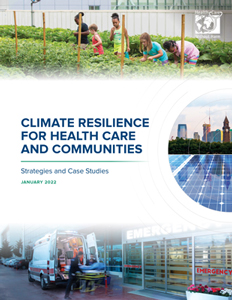 Climate Resilience for Health Care and Communities: Strategies and Case Studies provides a strategic framework for building truly climate-resilient health systems and communities, and explores how health care institutions can leverage investments to support equitable decarbonization and build community resilience, health, and wealth. Through case studies, this paper outlines actions health systems can take to improve their ability to adapt and recover from climate-driven service impacts, strengthen long-term sustainability, and support health and equity in the communities they serve.
Climate Resilience for Health Care and Communities: Strategies and Case Studies provides a strategic framework for building truly climate-resilient health systems and communities, and explores how health care institutions can leverage investments to support equitable decarbonization and build community resilience, health, and wealth. Through case studies, this paper outlines actions health systems can take to improve their ability to adapt and recover from climate-driven service impacts, strengthen long-term sustainability, and support health and equity in the communities they serve.
As anchor institutions, health systems have both a responsibility and an economic self-interest in making sure their communities are healthy, safe, and climate resilient. Health care institutions can leverage their social, political and economic influence to address social and environmental determinants of health and help communities improve their ability to adapt to and recover from climate impacts. It is essential to the long-term sustainability of health care and public health that health care institutions partner with the communities they serve to assess and address climate vulnerabilities.
